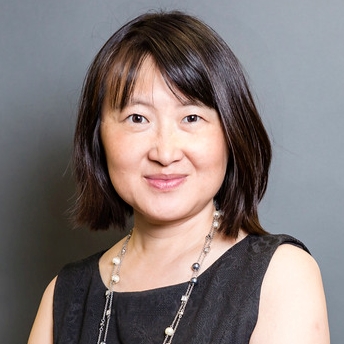
Common Impact is proud to highlight some of the impressive AAPI leaders we collaborate with and the ways that they foster equity and create opportunity in their local communities.
Today, we hear from Elena Zee, President & CEO of the Arizona Council on Economic Education (ACEE), an organization that envisions a world where all children are financially and economically literate. ACEE drives systematic financial inclusion by empowering teachers and educating more than 200,000 students from public, charter, tribal, private, home, and juvenile detention schools annually. Learn more about ACEE’s variety of student programs and volunteer opportunities.
You’ve served as President & CEO of the Arizona Council on Economic Education (ACEE) since 2013, prior to which you spent over two decades in the private sector in the global financial services industry. Tell us about your path to leadership and your current role.
I remember my first job interview when I was asked what I wanted to be in five to ten years. I just blurted out, “I want to be an entrepreneur.” I didn’t fully realize why or what that might have meant until later on.
My roles in the private sector always involved launching new products and services, identifying business transformation opportunities, and working with diverse teams worldwide. When I was serving on the board of ACEE, I started seeing this tremendous need for opportunities around financial and economic education. Our country had just come out of the Great Recession, and like many nonprofit organizations, ACEE was significantly impacted financially. It was then I felt the calling to change my career and dedicate myself to serving ACEE’s mission. It was then that I became a social entrepreneur.
A good education must include economic education. There has to be a systemic way to achieve financial literacy for all students on a large scale in order to achieve economic equity.
ACEE and Common Impact share a deep commitment to promoting equity. How does ACEE leverage economic education toward this end and where does your passion for this work stem from?
Like many people, I didn’t grow up with basic financial knowledge. My parents didn’t teach me about investment, mortgage, or insurance, and I certainly didn’t learn that from school. As a young adult, I was petrified whenever I had to make financial decisions. I noticed the origin of many people drowning in debt or making poor financial choices can be traced to a lack of financial literacy. I truly believe a good education must include economic education. There has to be a systemic way to achieve financial literacy for all students on a large scale in order to achieve economic equity. That is what ACEE aims to do.
Failure only becomes a reality when we stop learning from it or stop trying again in a better way. Every failure is a valuable learning opportunity and a step closer to success.
How have ACEE’s needs changed over the past few years and, in response, how have you taken advantage of skills-based volunteering to increase your organization’s capacity and deepen your community impact?
In response to COVID-19, we made our services available to schools virtually as soon as possible. Volunteers in our community also stepped up to the challenge. The number of ACEE volunteers increased by an astounding 86% in a very short period. As a result, we needed a systematic and efficient way to communicate with a large number of volunteers. Common Impact organized and facilitated skills-based volunteering to connect us with Charles Schwab employees to address this challenge. Through efforts like this, ACEE can impact the lives of hundreds of thousands of students annually.
What is one of the most important lessons in leadership that you’d like to pass along to other current or emerging leaders?
Failure only becomes a reality when we stop learning from it or stop trying again in a better way. Every failure is a valuable learning opportunity and a step closer to success.
4C leadership: Competence, Confidence, Character, and Comfort
In celebration of Asian American Pacific Islander Heritage Month, who is an AAPI leader, activist, thinker, or educator who inspires you?
There are many AAPI leaders I admire, including journalist Lisa Ling and Zoom Founder & CEO Eric Yuan. However, the one leader who is most personal to me and has inspired me since I was a teenager is my late aunt Shirley Young, a businesswoman, culture diplomat, and philanthropist. She arrived in the United States as a refugee from World War II. After graduating from college as class president with 4.0 GPA, the only job she could find was secretary. She overcame a multitude of barriers as a minority woman, working her way up to become president of a large advertising company in New York City. I carry her 4C leadership advice with me: Competence, Confidence, Character, and Comfort. “Comfort” refers to the ability to relate to anyone regardless of their different background and make them feel at ease.


